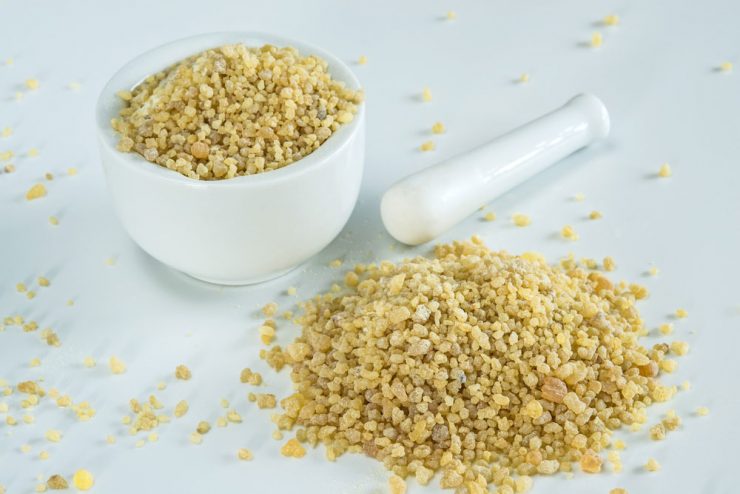The history:
Native to India, North Africa and the Middle East, Boswellia serrata, also known as frankincense or olibanum, is a large tree whose resin has been used medicinally, as well as in perfumery, aromatherapy and some religious ceremonies for thousands of years. The Egyptians used it to embalm their dead, while Egyptian women made heavy kohl eyeliner by grinding frankincense into a fine powder. Roman and Greek Catholics also used it in rituals as incense.
Over the years, however, it has been mostly valued for its medicinal properties. The Chinese used it as a stimulant, a topical ointment for injuries, skin eruptions and leprosy sores, a mouthwash for mouth and throat problems, and pain relief for menstrual problems. It was and still is especially favoured in Indian Ayurvedic medicine as an effective treatment for conditions such as arthritis, pain, fever and heart problems and as an antiseptic for wound healing.
How does it work?
Boswellia contains several anti-inflammatory substances, including boswellic acids, which inhibit the production of inflammatory immune chemicals. Studies have shown boswellia to be as effective in reducing discomfort as some non-steroidal, anti-inflammatory drugs (NSAIDs), but without their gastric and cardiovascular side effects.
What are its benefits?
Boswellia is thought to help a variety of inflammatory conditions, from inflammatory bowel disease (IBS) to psoriasis, asthma and osteoarthritis. It is particularly good for joint problems, and is often combined with other supplements such as turmeric and glucosamine for maximum effect.
Pain relief:
Boswellia is an effective analgesic, meaning it helps to increase pain tolerance. In a recent study of 12 healthy males[i] who inserted an index finger in a vice that applied pressure to the nail bed, the amount of pain they could tolerate, was significantly greater at one, two and three hours after taking boswellia compared with the group taking a placebo.
Osteoarthritis:
In a study of people with osteoarthritis of the knee,[ii] the group taking boswellia reported less pain and swelling, as well as better flexibility and an increased ability to walk further compared with the group taking a placebo.
Asthma:
Frankincense has been valued traditionally for its effect on the respiratory system, and has been used in steam inhalations, baths, and massages to treat cough, catarrh, bronchitis, and asthma. A six-week trial in patients with relatively mild asthma[iii] found that boswellia at a dosage of 300mg, three times a day, reduced the frequency of asthma attacks and improved breathing capacity.
Watch points:
Side effects are rare, although mild nausea and gastric reflux have been reported.
[i] https://www.ncbi.nlm.nih.gov/pmc/articles/PMC4175880/
[ii] https://www.ncbi.nlm.nih.gov/pubmed/21060724
[iii] https://www.ncbi.nlm.nih.gov/pmc/articles/PMC3924999/
























Add comment